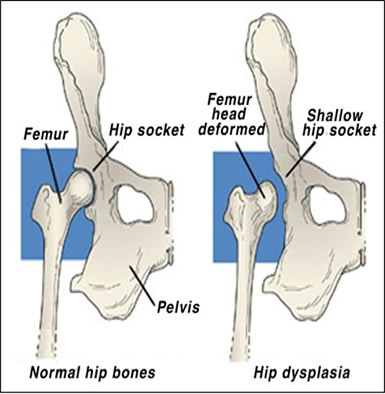Canine Hip Dysplasia
Canine hip dysplasia is an abnormal formation of the hip socket that, in its more severe form, can eventually cause crippling lameness and painful arthritis of the hip joints. Development of CHD is considered to have both hereditary (i.e.genetic) and environmental causes, making it important to test for CHD in the parents of any puppy you acquire. Reputable breeders obtain radiographic x-rays of the dog's hips after the dog is 24 months of age to determine the presence of CHD. Often, the x-rays are sent to the Orthopedic Foundation For Animals (OFA) to review and document the status of the hips. If the dog's hips are ranked as Excellent, Good, or Fair by OFA, the dog is awarded a permanent OFA number. If there are signs of hip dysplasia documented on the x-rays, OFA will rate the hips as Mild, Moderate or Severe CHD. Dogs can have CHD appear in both hips or only one hip (called unilateral CHD).
It is unusual for a Welsh Springer Spaniel to have serious health issues associated with CHD. In larger breeds,such as German Shepherd Dogs and Golden Retrievers, hip dysplasia can often be debilitating and may require medications and/or hip surgery to alleviate pain. In a medium-sized breed like our Welshies, there may be quite severe CHD but with minimal to no signs or symptoms of discomfort. Dogs with CHD are often able to continue their favorite activities with their owners, including hunting, Rally, Obedience, Agility, and even Conformation. There may be a need for pain control due to arthritis during some periods of the dog's life, but CHD neither shortens the lifespan nor diminishes the quality of life of a Welsh Springer Spaniel.
Rich and I do not feel comfortable using breeding stock with documented x-ray evidence of CHD, and have chosen to place some very promising show dogs into pet homes rather than compromise on this issue. However, there are other breeders who choose to make different decisions in this matter. We encourage you to be informed about CHD and speak about hip clearances with your breeder as part of making a decision about acquiring a puppy.
It is unusual for a Welsh Springer Spaniel to have serious health issues associated with CHD. In larger breeds,such as German Shepherd Dogs and Golden Retrievers, hip dysplasia can often be debilitating and may require medications and/or hip surgery to alleviate pain. In a medium-sized breed like our Welshies, there may be quite severe CHD but with minimal to no signs or symptoms of discomfort. Dogs with CHD are often able to continue their favorite activities with their owners, including hunting, Rally, Obedience, Agility, and even Conformation. There may be a need for pain control due to arthritis during some periods of the dog's life, but CHD neither shortens the lifespan nor diminishes the quality of life of a Welsh Springer Spaniel.
Rich and I do not feel comfortable using breeding stock with documented x-ray evidence of CHD, and have chosen to place some very promising show dogs into pet homes rather than compromise on this issue. However, there are other breeders who choose to make different decisions in this matter. We encourage you to be informed about CHD and speak about hip clearances with your breeder as part of making a decision about acquiring a puppy.
